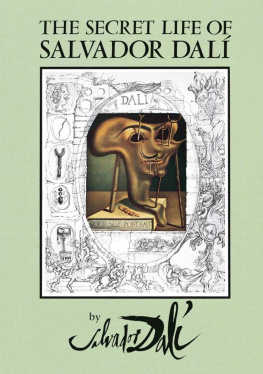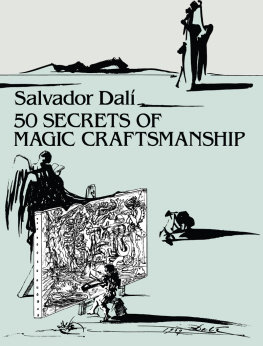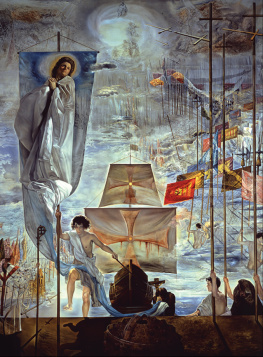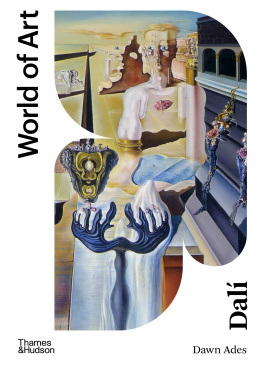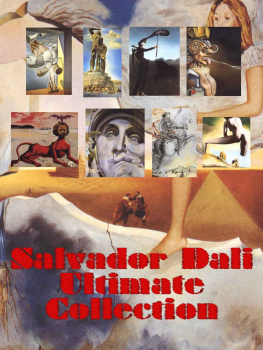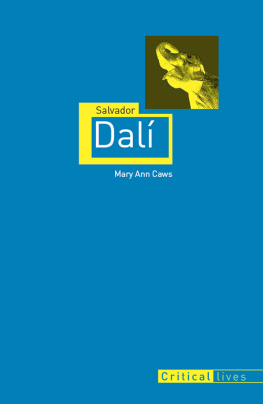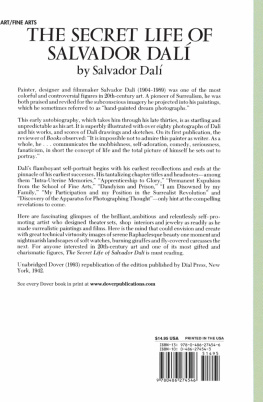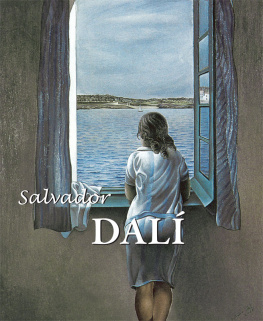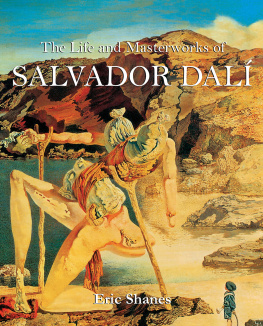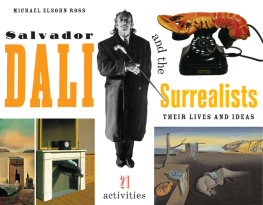THE SECRET LIFE
OF SALVADOR DALI
THE SECRET LIFE
OF SALVADOR BALI
BY
Salvador Dal
TRANSLATED BY HAAKON M. CHEVALIER
DOVER PUBLICATIONS, INC., NEW YORK
This Dover edition, first published in 1993, is an unabridged and slightly altered republication of the work originally published by the Dial Press, New York, in 1942. The two color plates, which were on unnumbered pages in the original edition, have been repositioned on the inside covers.
Library of Congress Cataloging-in-Publication Data
Dali, Salvador, 1904-1989
[Vie secrete de Salvador Dali. English]
The secret life of Salvador Dali / by Salvador Dali ; translated by Haakon M. Chevalier.
p. cm.
An unabridged and slightly altered republication of the work originally published by the Dial Press, New York, in 1942T.p. verso.
ISBN-13: 978-0-486-27454-6
ISBN-10: 0-486-27454-3
1. Dali, Salvador, 1904-1989. 2. PaintersSpainBiography. I. Title.
ND813.D3A2 1993
759.6dc20
[B]
92-36763
CIP
Manufactured in the United States by Courier Corporation
27454313
www.doverpublications.com
A Gala- Gradiva,
celle qui avance
Table of Contents

PROLOGUE
At the age of six I wanted to be a cook. At seven I wanted to be Napoleon. And my ambition has been growing steadily ever since.
Stendhal somewhere quotes the remark of an Italian princess who was eating ice cream with enormous relish one hot evening. Isnt it too bad this is not a sin! she exclaimed. When I was six, it was a sin for me to eat food of any kind in the kitchen. Going into this part of the house was one of the few things categorically forbidden me by my parents. I would stand around for hours, my mouth, watering, till I saw my chance to sneak into that place of enchantment; and while the maids stood by and screamed with delight I would snatch a piece of raw meat or a broiled mushroom on which I would nearly choke but which, to me, had the marvelous flavor, the intoxicating quality, that only fear and guilt can impart.
Aside from being forbidden the kitchen I was allowed to do anything I pleased. I wet my bed till I was eight for the sheer fun of it. I was the absolute monarch of the house. Nothing was good enough for me. My father and mother worshiped me. On the day of the Feast of Kings I received among innumerable gifts a dazzling kings costumea gold crown studded with great topazes and an ermine cape; from that time on I lived almost continually disguised in this costume. When I was chased out of the kitchen by the bustling maids, how often would I stand in the dark hallway glued to one spotdressed in my kingly robes, my sceptre in one hand, and in the other a leather-thonged mattress beatertrembling with rage and possessed by an overwhelming desire to give the maids a good beating. This was during the anguishing hour before the sweltering, hallucinatory summer noon. Behind the partly open kitchen door I would hear the scurrying of those bestial women with red hands; I would catch glimpses of their heavy rumps and their hair straggling like manes; and out of the heat and confusion that rose from the conglomeration of sweaty women, scattered grapes, boiling oil, fur plucked from rabbits armpits, scissors spattered with mayonnaise, kidneys, and the warble of canariesout of that whole conglomeration the imponderable and inaugural fragrance of the forthcoming meal was wafted to me, mingled with a kind of acrid horse smell. The beaten white of egg, caught by a ray of sunlight cutting through a whirl of smoke and flies, glistened exactly like froth forming at the mouths of panting horses rolling in the dust and being bloodily whipped to bring them to their feet. As I said, I was a spoiled child.
My brother died at the age of seven from an attack of meningitis, three years before I was born. His death plunged my father and mother into the depths of despair; they found consolation only upon my arrival into the world. My brother and I resembled each other like two drops of water, but we had different reflections. Like myself he had the unmistakable facial morphology of a genius. He gave signs of alarming precocity, but his glance was veiled by the melancholy characterizing insurmountable intelligence. I, on the other hand, was much less intelligent, but I reflected everything. I was to become the prototype par excellence of the phenomenally retarded polymorphous perverse, having kept almost intact all the reminiscences of the nurslings erogenous paradises: I clutched at pleasure with boundless, selfish eagerness, and on the slightest provocation I would become dangerous. One evening I brutally scratched my nurse in the cheek with a safety pin, though I adored her, merely because the shop to which she took me to buy some sugar onions I had begged for was already closed. In other words, I was viable. My brother was probably a first version of myself, but conceived too much in the absolute.
We know today that form is always the product of an inquisitorial process of matterthe specific reaction of matter when subjected to the terrible coercion of space choking it on all sides, pressing and squeezing it out, producing the swellings that burst from its life to the exact limits of the rigorous contours of its own originality of reaction. How many times matter endowed with a too-absolute impulse is annihilated; whereas another bit of matter, which tries to do only what it can and is better adapted to the pleasure of molding itself by contracting in its own way before the tyrannical impact of space, is able to invent its own original form of life.
What is lighter, more fanciful and free to all appearances than the arborescent blossoming of agates! Yet they result from the most ferocious constraint of a colloidal environment, imprisoned in the most relentless of inquisitorial structures and subjected to all the tortures of compression and moral asphyxiation, so that their most delicate, airy, and ornamental ramifications are, it seems, but the traces of its hopeless search for escape from its death agony, the last gasps of a bit of matter that will not give up before it has reached the ultimate vegetations of the mineral dream. Hence what we have in the case of the agate is not a plant transformed into a mineral, or even a plant caught and swallowed up in a mineral. On the contrary, we actually have the spectral apparition of the plant, its arborescent and mortal hallucination: the end and form of the inquisitorial and pitiless constraint of the mineral world.
So too the rose! Each flower grows in a prison! In the aesthetic point of view freedom is formlessness. It is now known, through recent findings in morphology (glory be to Goethe for having invented this word of incalculable moment, a word that would have appealed to Leonardo!) that most often it is precisely the heterogeneous and anarchistic tendencies offering the greatest complexity of antagonisms that lead to the triumphant reign of the most rigorous hierarchies of form.

Even as men with unilateral, one-way minds were burned by the fire of the Holy Inquisition, so multiform, anarchistic mindsprecisely because they were suchfound in the light of these flames the flowering of their most individual spiritual morphology. My brother, as I have already said, had one of those insurmountable intelligences with a single direction and fixed reflections that are consumed or deprived of form. Whereas I was the backward, anarchistic polymorphous perverse. With extreme mobility I reflected all objects of consciousness as though they were sweets, and all sweets as though they were materialized objects of consciousness. Everything modified me, nothing changed me; I was soft, cowardly, and resilient; the colloidal environment of my mind was to find in the unique and inquisitorial rigor of Spanish thought the definitive form of the bloody, jesuitical, and arborescent agates of my curious genius. My parents baptized me with the same name as my brotherSalvadorand I was destined, as my name indicates, for nothing less than to rescue painting from the void of modern art, and to do so in this abominable epoch of mechanical and mediocre catastrophes in which we have the distress and the honor to live. If I look toward the past, beings like Raphael appear to me as true gods; I am perhaps the only one today to know why it will henceforth be impossible even remotely to approximate the splendors of Raphaelesque forms. And my own work appears to me a great disaster, for I should like to have lived in an epoch during which nothing needed to be saved! But if I turn my eyes toward the present, although I do not underestimate specialized intelligences much superior to my ownyes, I shall repeat it a hundred timesI would for nothing in the world change places with anyone, with anyone whomsoever among my contemporaries. But the ever-perspicacious reader will already have discovered without difficulty that modesty is not my specialty.
Next page
